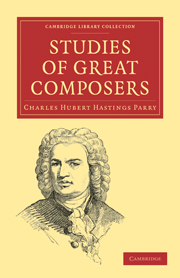VIII - FRANZ SCHUBERT
Published online by Cambridge University Press: 29 August 2010
Summary
Every one notices that the greatest composers have almost always had some special province of their own, and have established their right to the highest rank by producing something thoroughly ripe and perfect of a kind which has not been matured before. The reasons are commonly overlooked, but they are not hard to find. The processes by which great forms of musical art, such as masses, motetts, oratorios, operas, symphonies, and sonatas, were made by degrees more and more perfect, have always culminated in some happily constituted individual, to whom it has been allotted to produce the first completely mature examples, and to sum up in his work the labours of the musical generations who had gone before. It was conspicuously so in the case of Palestrina, Handel, Bach, and Beethoven, and at the beginning of the present century it came to the turn of Schubert to become the representative composer who first brought the artistic form of musical song to its mature perfection.
It may seem strange to people who have not considered the matter with any attention, that song should come to perfection so late. It seems to be the simplest and most natural kind of music, and one of the easiest to produce and to understand. And yet it had to wait for the develop ment of almost all the greater forms of art before it began to appear in its perfect lineaments; and it was only by means of the enormous quantity of musical work done in all the other branches, both in the matter of form and expression, that song, as it has been produced by the German composers of this century, became possible.
- Type
- Chapter
- Information
- Studies of Great Composers , pp. 223 - 254Publisher: Cambridge University PressPrint publication year: 2009First published in: 1887

